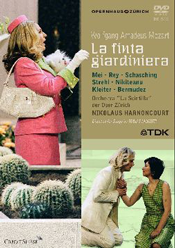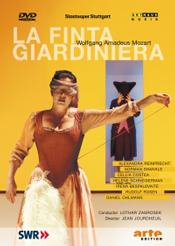
20 Jul 2008
Mozart’s La Finta Giardiniera x2
With a composer as widely beloved as Wolfgang Amadeus Mozart, for an opera to be all but forgotten suggests the work has problems beyond redemption.
The opera world, always ravenous for talented, charismatic tenors, felt desperate hunger pains last summer, when Rolando Villazón canceled dates with an explanation that a health crisis necessitated a sabbatical from singing.
For the opera of average length, a decent highlights disc can feature as much as half the score.
At the Rossini Festival held in Pesaro, Italy, Dynamic recorded two Rossini rarities in August 2006.
The late Guiseppe Sinopoli (1946-2001) became established as an estimable conductor of nineteenth-century music, and his legacy includes a number of fine recordings.
The best thing about this set, a Norma recorded live at the Teatro delle Muse di Ancona in late 2004, is the booklet essay by Marco Beghelli, offered in both English and Italian (no credit to any translator).
At one time, Verdi’s Aida figured as the most performed opera.
This Dynamic recording of Meyerbeer's Semiramide, an opera title more familiar with Rossini's name appended, mixes the pleasure of a modestly appealing surprise with regret at key aspects of the performance.
Among the choral music of Anton [Antonin] Dvorak, the familiar Stabat Mater, Op. 58, is known to modern audiences through various live performances and recordings.
A nostalgic charm permeates these filmed productions from the early 1970s of Lortzing's Zar und Zimmerman and Mozart's Die Zauberflöte, collaborations between the Hamburg State Opera and German TV director Joachim Hess.
The opera highlights series from Classics for Pleasure continues its recycling of the EMI catalogue with selections from two of Herbert von Karajan's recordings.
With this recording of songs by Henry & William Lawes, musical brothers who flourished in Caroline England, countertenor Robin Blaze with lutenist Elizabeth Kenny continue their exploration of early English song for Hyperion, and the results are stunning.
The title of this recording “Joy: the Laments of Gilles Binchois” introduces a seeming contradiction, one that plays on a contemporaneous description of the composer as "pére de joyeusetè"—the father of joy—in tension with an affinity for melancholy in his works.
Even though it is one of the important operas of the twentieth century, Arnold Schoenberg’s Moses und Aron is, perhaps, more esteemed than performed.
Premiered in 1926, Paul Hindemith’s opera Cardillac is a three-act work based on E. T. A. Hoffmann’s short story Das Fräulein von Scuderi.
In the 1983 production designed, staged, and directed by Jean-Pierre Ponnelle, this recording of Richard Wagner’s Tristan und Isolde is a solid and well-thought performance that has much to offer.
Recorded between 1938 and 1942, the excerpts from performances of Der Rosenkavalier, Die Frau ohne Schatten, Arabella, and Daphne at the Dresden Staatsoper are all conducted by Karl Böhm.
At the centenary of the birth of the conductor Herbert von Karajan various commemorations are occurring, an among them is the concise CD and DVD release by Deutsche Grammophon, with both discs bound into a booklet that includes a short prose tribute to the man illustrated with some well-chosen photographs from various parts of his career.
Consumers might opt for a highlights set instead of a full recording of an opera for many reasons.
Naxos's DVD division has already released the performances on this disc of Virgil Thomson's scores for The Plow that Broke the Plains and The River, as soundtracks for a re-release of the original films. That DVD (Naxos 2.110521) contained, as...
Why should anyone buy a German language broadcast of a delicious French opéra-comique?

With a composer as widely beloved as Wolfgang Amadeus Mozart, for an opera to be all but forgotten suggests the work has problems beyond redemption.
In the most recent “Mozart year” (they seem to come around often), companies stretched out to find lesser known corners of Mozart’s repertoire, and La Finta Giardiniera found itself staged around the world, almost as if it had just been rediscovered in some dusty drawer. Both DVDs discussed here come with 2006 copyrights. Though neither cast features “star” performers, the Zurich staging might seem to have more prestige. Conductor Nikolaus Harnoncourt leads the Orchestra “La Scintilla” of the Zurich opera house, with soprano Eva Mei and upcoming tenor Christopher Strehl in the leads. In the Stuttgart version, Alexandra Reinprecht and Norman Shankle take on those roles. Both productions can fairly be called modern stagings, with the spare, pastel aesthetic your reviewer calls “Crate and Barrel.” However, the Stuttgart designers, perhaps surprisingly for a house with a reputation for boldness, stick to fairly traditional costuming. In Zurich, the singers cavort in contemporary threads.
What matters, however, is that both of these DVDs give fair evidence that La Finta Giardiniera has been unwisely neglected. Mozart’s melodic flair had not matured when he composed the score, but putting aside the lack of instantly memorable tunes, the music is always dramatically apt and frequently inventive. The opening of act three, in particular, has the sort of sweet, sad atmosphere of one of the great piano concerto adagios. And what once might have been considered the libretto’s weakness of a diffuse, confused scramble of mismatches and pained redemption, actually plays quite well in the 21st century — certainly better than the faux-religiosity of The Magic Flute.
 The Stuttgart production gives the back story in a pantomime under the overture. Count Belfiore had caught his beloved, Violante, in a compromising situation and assaulted her, with a knife yet. She recovered and fled, and he has gone in search of her. She calls herself Sandrina now, while working as a gardener for the mayor of a small town. A niece, a female servant, and a visiting knight are thrown into the mix, with the comings and goings at some points resembling the first act action of Don Giovanni — and La Finta Giardiniera is also called a “dramma giocoso.”
The Stuttgart production gives the back story in a pantomime under the overture. Count Belfiore had caught his beloved, Violante, in a compromising situation and assaulted her, with a knife yet. She recovered and fled, and he has gone in search of her. She calls herself Sandrina now, while working as a gardener for the mayor of a small town. A niece, a female servant, and a visiting knight are thrown into the mix, with the comings and goings at some points resembling the first act action of Don Giovanni — and La Finta Giardiniera is also called a “dramma giocoso.”
As directed by Tobias Moretti, the Zurich staging has much more “giocoso” than that in Stuttgart. In fact, the comedy gets played up a bit broadly, although Eva Mei’s stricken Sandrina manages to be affecting throughout. The clean white set features two beds of various cacti, a not too confusing symbol for the pain that has sprouted in these lovers’ hearts. Moretti goes in too often for silly pantomime skits between numbers, which partly explains why this is a two disc set, as opposed to the single disc for the Stuttgart version (Stuttgart also appears to have cut some numbers). Although the comedy gets a bit broad, this Zurich production overall features more impressive singing and the dynamic leadership in the pit of Harnoncourt. Unfortunately, the booklet note tends to the obtuse, and without a plot summary, some viewers may find the action confusing.
The Arthaus Musik DVD for Stuttgart delivers an exemplary booklet, with a fine essay on the opera, a summary, and artist biographies. Furthermore, as directed by Jean Jourdheuil, the action comes across with great clarity, although the set never really establishes any particular locale (neither does that in Zurich). Jourdheuil references the comedy when appropriate, but the emphasis is on the mental distress and confusion of the wayward lovers. When they all congregate in a darkened garden, they wear lighted goggles, and still fumble around in the dark, unable to really locate each other.
If only the cast were more interesting to listen to. A former member of San Francisco Opera’s Merola program, Shankle has a very pleasant tenor, though he hardly seems like the violently jealous type. Alexandra Reinprecht, decent enough, only makes Eva Mei look all the more impressive. The other voices make no special impression, excepting the annoying gruffness of Daniel Ohlmann’s mayor.
So true Mozart lovers who have yet to get to know La Finta Giardiniera should probably find room in their budget for both these DVDs. If that can’t be done, it’s a choice between better singing (Zurich) and a more comprehensible staging (Stuttgart). And opera companies looking to broaden their repertory (are there any such in the USA?) should give this early Mozart work another look.
Chris Mullins